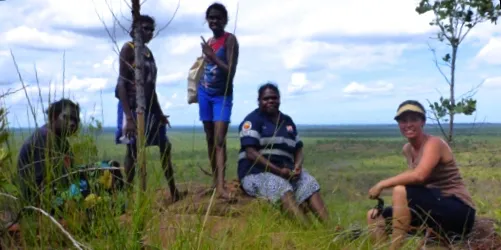ALA Two-way Indigenous Engagement Case Study
In October 2014, a project began in SE Arnhem Land to document biodiversity using Indigenous and Western knowledge. The Yugul Mangi Rangers collaborate with ecologists to input data into the Atlas of Living Australia, aiming to enhance biodiversity understanding and create employment pathways for the community.
Project status
Content navigation
About

Funded October 2014
- Craig Moritz, ANU
- Rebecca Pirzl, CSIRO
- John La Salle, CSIRO
- Emilie-Jane Ens, Macquarie
Biodiversity in Indigenous Protected Areas (IPAs) is high, yet poorly documented.
To assist with this, the Aboriginal Yugul Mangi Rangers (a group of five men and four women) are working together with Emilie Ens and Mitchell Scott, ecologists from Macquarie University.
Using local Indigenous knowledge, biodiversity data from SE Arnhem Land will be put into the Atlas of Living Australia using both Western scientific names and information, and indigenous names, uses and significance.
Based in SE Arnhem Land, this project aims to facilitate the exchange of biodiversity knowledge by:
- Demonstrating the value of the ALA to Indigenous Australians;
- Demonstrating the value of Indigenous knowledge to non-Indigenous Australians; and
- Promoting cross-cultural ways of knowing and managing Country.
The project also aims to:
- Build local capacity of Rangers to better understand the locations/habitat and status/condition of fauna and flora from Indigenous and Western perspectives;
- Facilitate intergenerational transfer of Indigenous knowledge;
- Create clearly definable employment pathways from school to Rangers and related research opportunities;
- Provide employment opportunities for elders; and
- Engage the whole community in Working on Country activities.
Field guides, local herbaria and preserved fauna collections and school learning products will be generated for the local Ngukurr community, Yugul Mangi Rangers and proposed SE Arnhem Land IPA
Progress and outcomes
- Community-led science in Arnhem Land
- Sharing Indigenous women’s knowledge of biodiversity and culture across tribal boundaries in Arnhem Land
- ALA Symposium 2016 presentation by Maritza Roberts and Basil Murrungun
- Learning by doing: the Yugul Mangi Rangers and ecologists conduct two-way biodiversity research in remote Arnhem Land with ALA support
- First ALA records of elusive Leichhardt’s Grasshopper in Arnhem Land
- Returning to the remote Country of the Ngandi people
- Remote Indigenous communities are vital for our fragile ecosystems
- CBA Seminar: ALA Two-way Indigenous Engagement Case Study
- Bringing south-east Arnhem Land stories to south-east Australia mob
- Ens, E., et al. 2016 Putting indigenous conservation policy into practice delivers biodiversity and cultural benefits. Biodiversity and Conservation 25: 2889 https://doi.org/10.1007/s10531-016-1207-6
- Eureka Prize for indigenous citizen science
